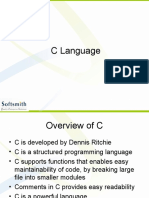0% found this document useful (0 votes)
140 views3 pagesC Language Notes
C is a general-purpose programming language known for its performance in system and embedded programming. The document covers key concepts such as program structure, data types, control flow, functions, pointers, and file I/O. It also includes examples and standard library functions commonly used in C programming.
Uploaded by
adityaiitd23Copyright
© © All Rights Reserved
We take content rights seriously. If you suspect this is your content, claim it here.
Available Formats
Download as PDF, TXT or read online on Scribd
0% found this document useful (0 votes)
140 views3 pagesC Language Notes
C is a general-purpose programming language known for its performance in system and embedded programming. The document covers key concepts such as program structure, data types, control flow, functions, pointers, and file I/O. It also includes examples and standard library functions commonly used in C programming.
Uploaded by
adityaiitd23Copyright
© © All Rights Reserved
We take content rights seriously. If you suspect this is your content, claim it here.
Available Formats
Download as PDF, TXT or read online on Scribd
/ 3

























































